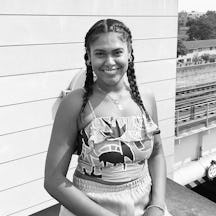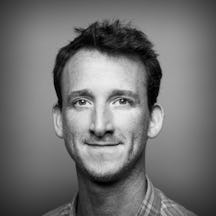In mortal danger after converting to Christianity, Ghazal and Mohammad fled Iran for the safety of Europe. But the harsh conditions of a Greek refugee camp pushed them to embark on another dangerous journey. They tell Vanesha Kirita Singh how their lives and health have been affected, and how the power of painting is helping Ghazal recover.
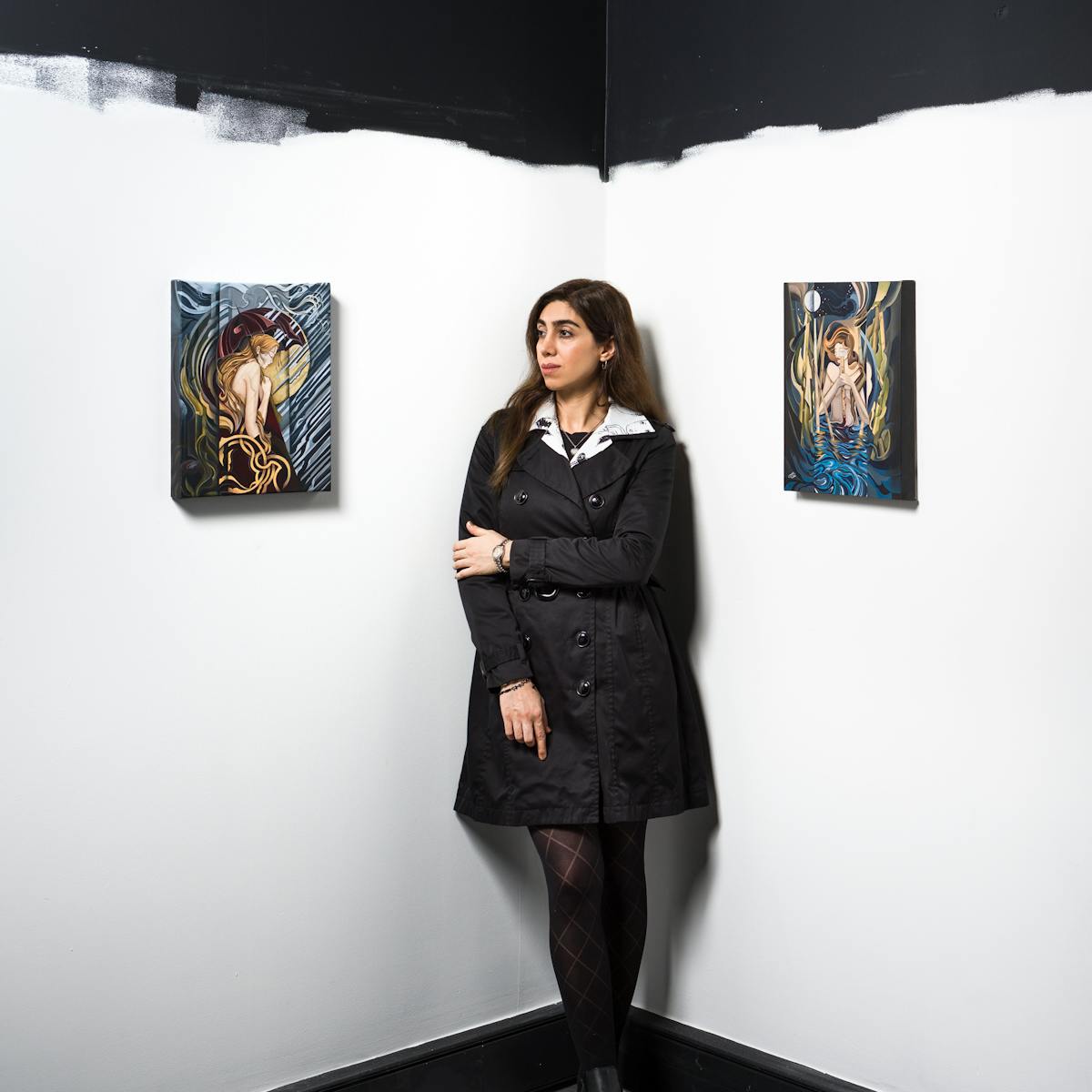
How would you look after yourself on an allowance of £1.30 a day, in a cost-of-living crisis, without the right to work?
When temperatures plummet and food prices soar, how do you afford the items your body needs to fight off viruses and infections? And how useful would they be if you’re not allowed to take food into the small hotel room you’ve been confined to for almost a year, as you wait for your asylum-seeking claim to be approved?
These are the material conditions people seeking asylum in the UK are placed under. Among them are Iranian artist Ghazal Zargar and her husband Mohammad, who trained as an architect before fleeing to Europe last year.
It recently took them over a month to bounce back from the flu. At home they would have recovered much sooner, following the family remedy of hot tea with fresh ingredients like mint and ginger: the proper Persian way, as Mohammad’s mother would insist.
Now the couple have little choice but to eat the meals provided by their hotel. They’re grateful, but eating hamburgers and chips most evenings for the last ten months is taking a toll on their bodies.
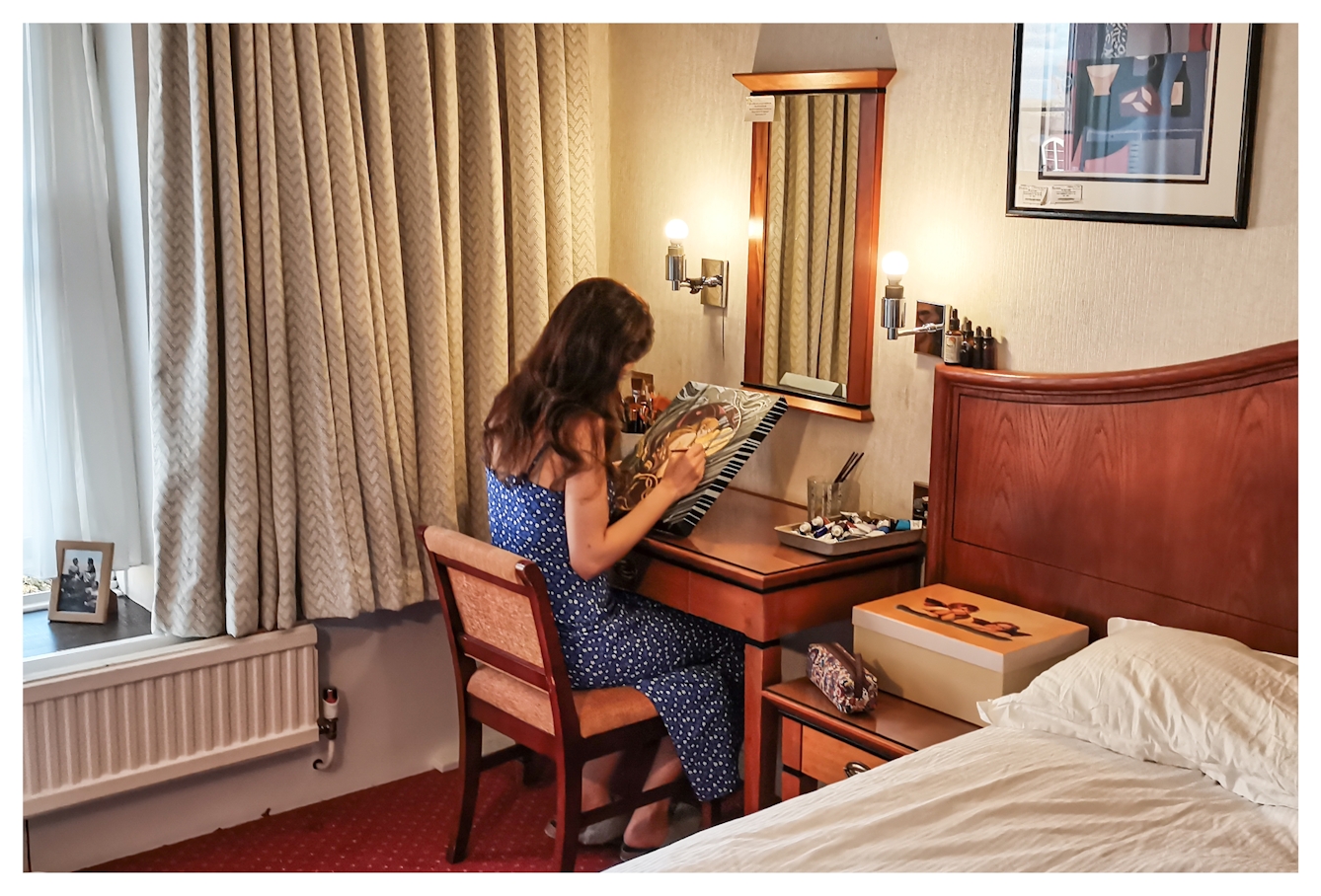
Ghazal creating her artworks at a desk in her hotel room.
“The food and clothes are not important. It is the heart that needs help,” says Mohammad. “Mental health is more important than food. If your heart has a problem, or your mind, it’s not possible to be well with ginger,” he tells me.
For Ghazal’s mental health, painting has been a vital, therapeutic release. “When I’m painting, I don’t think of the bad things. I feel freedom. It’s peaceful, it calms my soul. I forget where I am,” she says in Persian, as Mohammad translates.
We took photos of Ghazal’s artwork to accompany Furaha Asani’s story on being abandoned by her church after her immigration status became insecure, an experience which the couple say they feel deeply connected to.
The four paintings show a young woman in turmoil as she is forcibly displaced. The series begins with the young woman leaving behind a land of cypress trees – a symbol of life, freedom and resistance in Iranian culture – as she crosses a “stormy sea” with her life in her hands. The pain and trauma of Ghazal and Mohammad’s journey to the UK is reflected in these beautiful paintings, which are rich with symbolism.
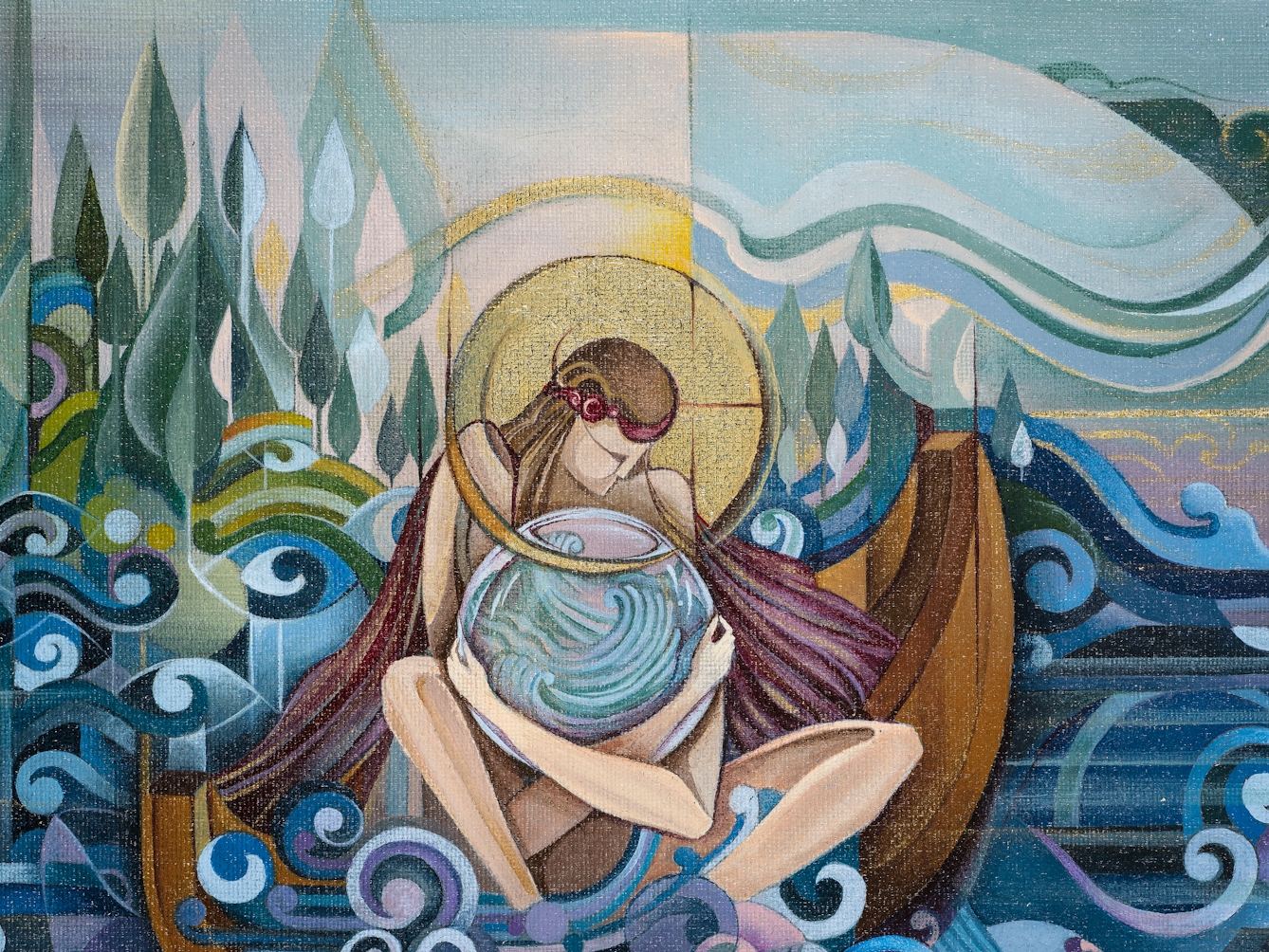
'Immigration and the hostile environment'. Acrylic on canvas. 2023. Detail from larger artwork.
Heading to the hostile environment
Ghazal and Mohammad are two of the 45,756 people who are known to have crossed the Channel to the UK in a small boat in 2022.
In total, their journey here cost around €20,000, all handed over to people smugglers.
Smugglers operating in France had promised them space on a ‘ship’ to England. But when Ghazal and Mohammad arrived on the shores of Calais, they saw an inflatable dinghy and realised they’d been deceived. They remember it being a freezing, windy night in April with high, crashing waves, and were prepared to lose thousands to find a safer route here.
But with a gun to their heads, they were forced aboard. They say the boat ride was terrifying, and felt they could die at any moment, but risked it all for the chance of a better life in the UK after struggling to survive in Greece.
Just a day after they arrived in the UK, the government announced its intention to deport asylum seekers to Rwanda. “Everyone is scared with that news,” they tell me.
Ghazal and Mohammad were under no illusion that the UK would be like ‘heaven’. But they didn’t think it would be so difficult to work and rebuild their lives here, given we are a high-income country, supposedly with one of the best healthcare systems in the world.
Still, for now, they feel safe here. They are ‘fine’, Ghazal insists, as tears stream down both their faces.
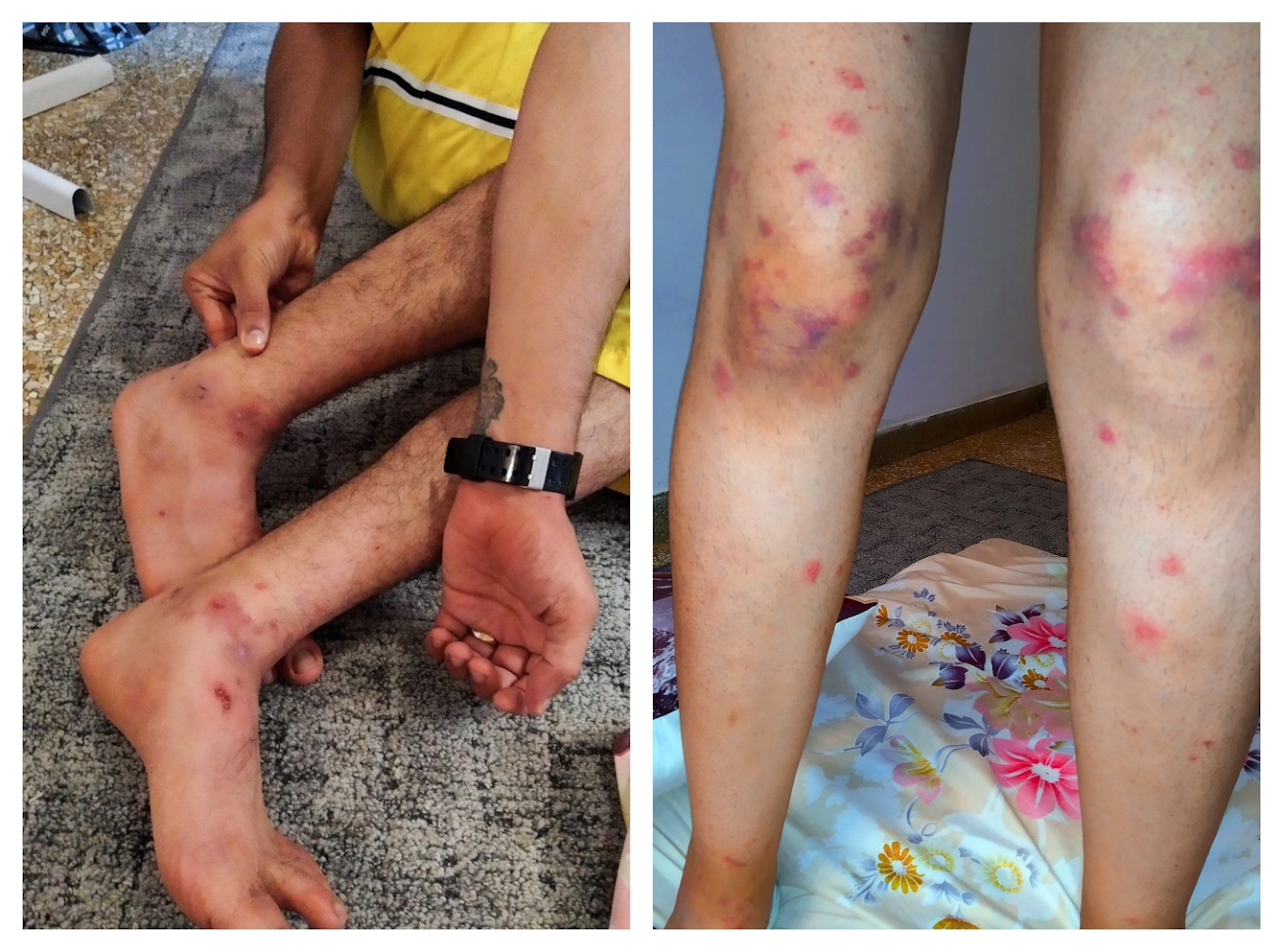
Injuries Ghazal and Mohammad sustained during their crossing on foot from Iran to Turkey.
What being smuggled can do to a body
Ghazal and Mohammad’s decision to leave Iran was made in just a few hours, after members of their church were murdered by the government for converting to Christianity. The couple knew they were in imminent danger.
It took Ghazal and Mohammad seven days to be smuggled from Tehran to Istanbul and then on to Greece. They would travel at night through forests and jungles, wading across deep rivers and climbing mountains – all in complete darkness, so as not to get caught.
Weak, terrified, bitten and bruised, and with no food or drink except for the meagre bits they could forage, Ghazal became delirious. She remembers hallucinating a river with clean water that she visited as a child. “She saw it as real, but there wasn’t one,” Mohammad explains.
Their living conditions remain poor and their future still feels so uncertain.
Ghazal points to one of the paintings in the series, which shows the young woman playing a flute cut from river reeds. “I painted the girl in the water at night because one of the most disturbing experiences was having to cross wild rivers or seas without knowing what is under my feet,” she tells me.
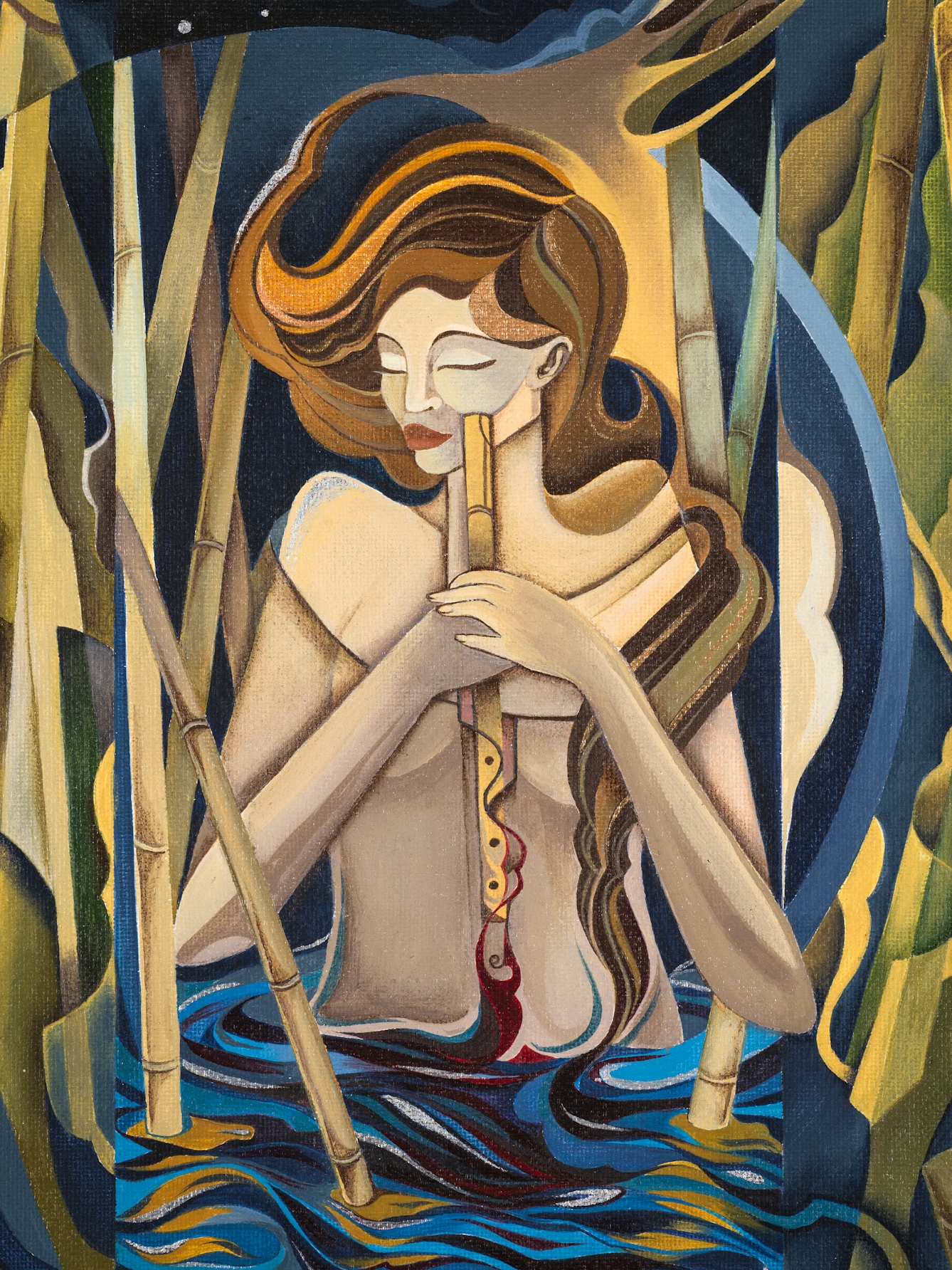
‘Separation from the root’. Acrylic on canvas. 2023. Detail from larger artwork.
Again, her painting is steeped in Iranian symbolism: the 13th-century Sufi poet Rumi famously wrote ‘The Song of the Reed’, where he compares the soul to a reed flute that is full of sorrow as it longs to return to the riverbed it was torn from.
Accessing antidepressants as a refugee
Once out of Iran, Ghazal and Mohammad made their way to Greece. “We believed the police there would help us,” they tell me. But the couple were imprisoned separately for two and a half months, and Mohammad would spend “day and night” questioning why they were being treated with such disdain.
After being released, they were homeless for six months, waiting for space to become available at a refugee camp; the lack of respect, resources and rights afforded to those forcibly displaced were laid bare once again.
By this point, Ghazal had lost 12 kg, and Mohammad 18 kg.
Conditions in the refugee camp were squalid and violent: poor sanitation, mattresses infested with bugs, and no doors on huts. Hundreds of people from different countries were cramped into a small space, surrounded by barbed wire, unable to leave.
But there was a sense of community, and refugees would help each other find access to healthcare.
Footage taken by Ghazal and Mohammad of their accommodation at the refugee camp in Greece.
Through other people in the camp, the couple found out about a volunteer doctor who assisted women with their mental health. She was notoriously difficult to find, but eventually they tracked her down and Ghazal was prescribed antidepressants. “It wasn’t easy. If no one had said to us, you couldn’t have found out about it,” Mohammad tells me.
But like Furaha, Ghazal and Mohammad had church communities in Greece and the UK turn their backs on them; their leaders and members offered no care or compassion, despite knowing the hardship the couple were facing.
“That really had a bad effect on our heart,” says Mohammad. “But we don’t want to judge anybody. We just had to change our church and it really upset us,” he says.
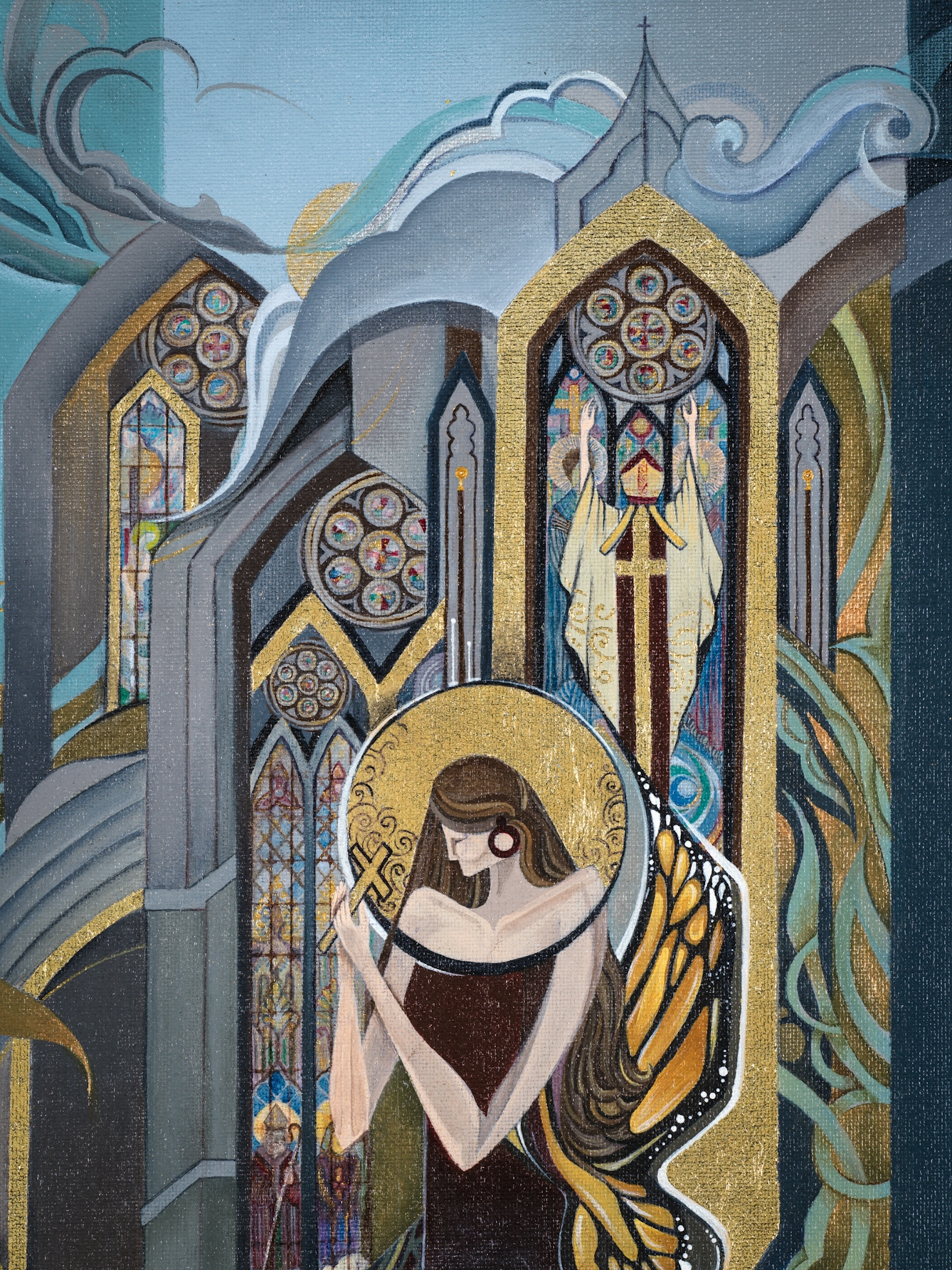
‘The way of truth’. Acrylic on canvas. 2023. Detail from larger artwork.
This is reflected in Ghazal’s painting titled ‘The way of truth’; the young woman is painted back to back with a priest. “He is engrossed in prayer and the work of the church and unfortunately they have distanced themselves from the most important thing of Christianity, which is love for others. Of course this is not all churches,” Ghazal explains. “But the small cross in her hand shows her trust in God.”
Look closer, and you see the young woman is coming out of a cocoon, like a butterfly: a sign of transformation.
Kindness is the best medicine
Though the antidepressants have calmed Ghazal’s PTSD, they can only help so much – particularly as their living conditions remain poor and their future still feels so uncertain. They’re also terribly homesick, unable to check in with loved ones because of the surveillance in Iran. “Antidepressants can’t remove everything in your mind,” she says.
At every point of their asylum-seeking journey, Ghazal and Mohammad have experienced racism, exploitation and neglect. Theirs is a story of the physical and emotional harm that comes from a lack of safe, legal routes for refugees, and of networks of organised crime that are capitalising on this hostile environment. Another of Ghazal’s paintings shows the young woman holding a ripped umbrella, a symbol of the lack of protection.
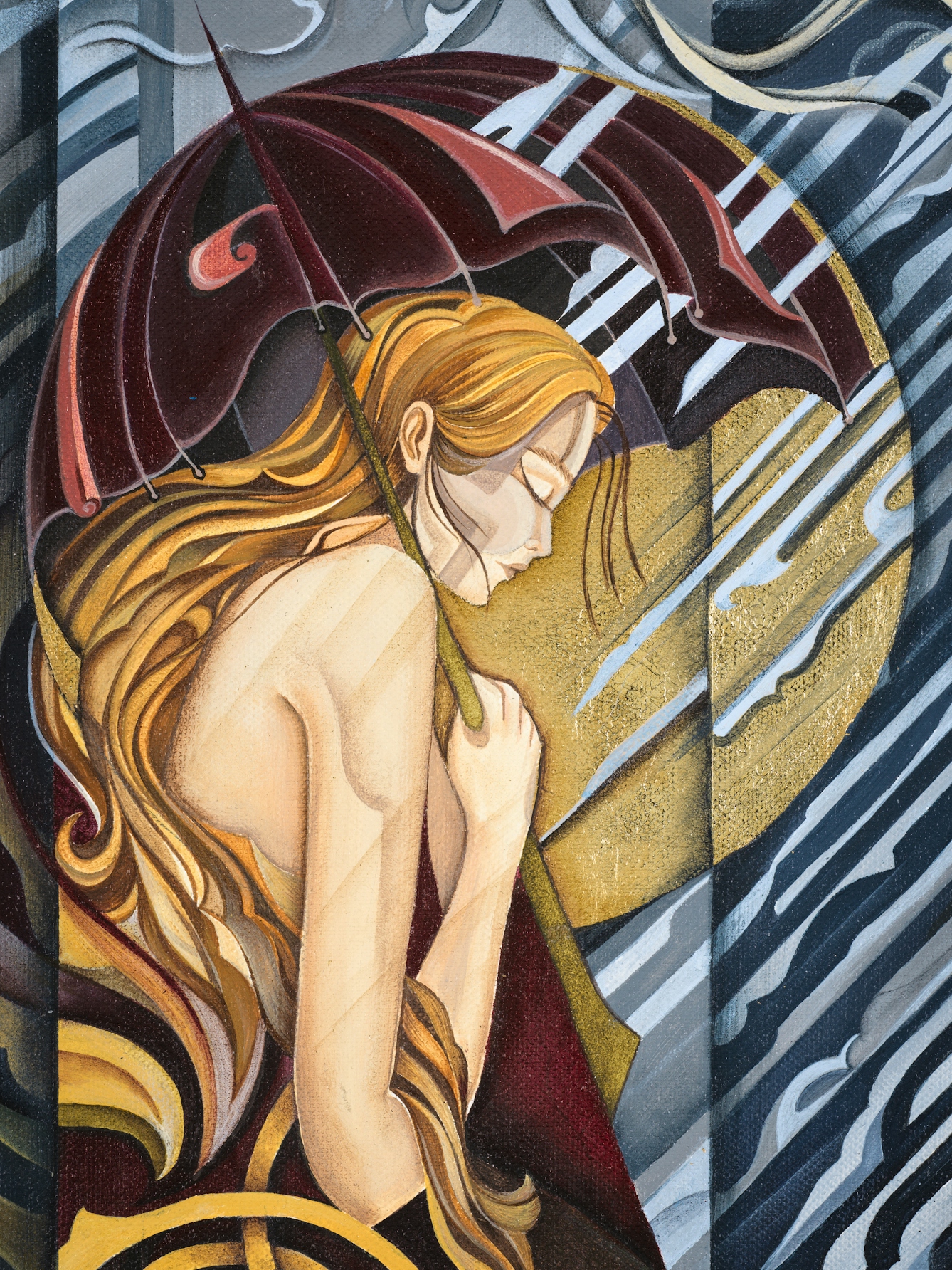
‘Support and shelter’. Acrylic on canvas. 2023. Detail from larger artwork.
But members of their new church and local community groups have shown the couple humanity, and it’s having a healing effect. “We found another church in the UK and they are really, really kind. In the beginning when we arrived here, we were very isolated, but now we find them and they are really nice. They spend time talking to Ghazal. They ask: ‘What’s the problem? How can I help you?’” Mohammad explains. This, they say, is the true spirit of Christianity that first attracted them to converting.
Crucially, people have come together to help Ghazal get tools for painting and they encourage her to keep making art. This is allowing Ghazal to process trauma. Studies carried out in the UK and further afield confirm that giving refugees resources to paint and draw safely can improve their wellbeing. The wider creative arts, like dancing and singing, are also proven to be of benefit. Yet we are so far from a government that could provide such a service.
Where politicians are failing, communities are stepping in: the friends Mohammad and Ghazal are making have shown such kindness, and regularly invite the couple to their homes for lunch, dinner and coffee. “They are like our family,” says Ghazal. This compassion alleviates the pain in her heart and mind in a way she believes antidepressants cannot.
As Mohammad tells me, these acts of love and care are a hundred times more powerful for our wellbeing than any medication.
About the contributors
Vanesha Kirita Singh
Vanesha is a Digital Editor for Wellcome Collection. She is a writer and researcher, and is also working to deepen our understandings of history by telling stories from the Indo-Caribbean community.
Benjamin Gilbert
Ben is a senior photographer for Wellcome. He is happiest when telling stories with his photographs, whether that be the health implications of rural-to-urban migration in India, or the dedication of the workers who power the NHS.
